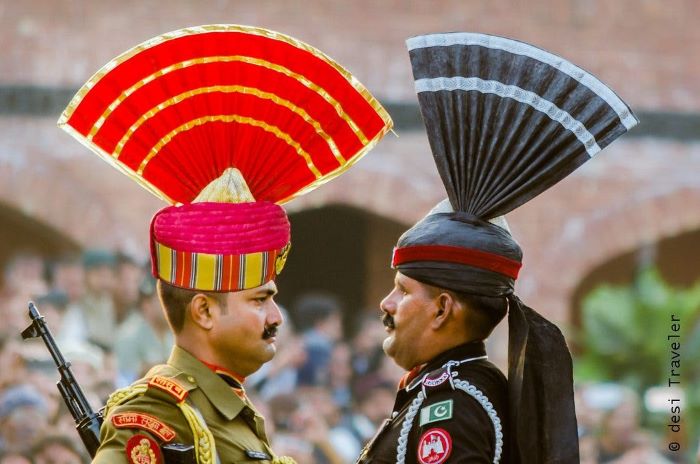 In the green fields of Punjab, where farmers work hard to grow food for India, people often dream about opening the Wagah border for easy trade. Picture trucks full of fresh fruits and veggies rolling from Amritsar through Pakistan to places like Europe or Russia. This could cut long sea trips from 16,000 kilometers down to just 5,000-7,000 kilometers over land, saving weeks and lots of money. Before it closed in 2019, trade through Wagah was worth $830 million. It sounds great for jobs and growth in Punjab, a state stuck without direct sea access.
In the green fields of Punjab, where farmers work hard to grow food for India, people often dream about opening the Wagah border for easy trade. Picture trucks full of fresh fruits and veggies rolling from Amritsar through Pakistan to places like Europe or Russia. This could cut long sea trips from 16,000 kilometers down to just 5,000-7,000 kilometers over land, saving weeks and lots of money. Before it closed in 2019, trade through Wagah was worth $830 million. It sounds great for jobs and growth in Punjab, a state stuck without direct sea access.
But right now, in October 2025, this idea feels like a mirage—a fake hope—in the middle of bad relations with Pakistan. Their plan to hurt India bit by bit through terror and drugs makes it too risky.
Let’s look at the bright side first. Opening Wagah could help Punjab sell goods faster to nearby countries like Afghanistan or even farther to the Middle East and Europe. Afghan traders keep asking both sides to reopen it, as the closure hurts everyone with stuck shipments. In May 2025, Pakistan let 150 Afghan trucks cross as a short fix during a ceasefire. Punjab’s businesses, hit hard by the shutdown, want this back. Even hidden trade through places like the UAE shows there’s a $10 billion chance if we make it official.

Is former Member of Punjab Public Service Commission
A farmer and keen observer of current affairs
Personally, I support opening the Wagah route for trade—if the geopolitical mindset of hostilities changes. If Pakistan stops the fighting and builds real trust, this could be a win for everyone, bringing peace and money.
But the dark side is real and scary. Pakistan’s “thousand cuts” plan—small attacks to weaken India—keeps going. The 2025 crisis with missile strikes shut borders tight, stopped visas, and even changed the famous Wagah flag ceremony to no handshakes, just cold looks. Trade is now tiny, and people in Amritsar who worked at the border are out of jobs. Worse, drugs and guns flood in from Pakistan, hurting Punjab’s young people. Just this week, police caught a smuggling group tied to Pakistan, grabbing pistols and heroin from drones. Punjab’s anti-drug drive has seized over 1,300 kg of heroin and arrested 31,000 people in months, with drone attacks jumping from 3 in 2021 to 179 last year. This mess feeds addiction—one in three young folks try drugs beyond booze or smokes—and adds to joblessness and anger.
Opening Wagah now would make this worse, turning trade roads into paths for more drugs and terror. India can’t risk it while Pakistan stays hostile. Instead, we should focus on fixing things inside. India has hugely improved road infrastructure to link Punjab to ports, turning it from a landlocked state into one with easy port access. Big projects like the Amritsar-Jamnagar Expressway (1,256 km, partly open, full by December 2025) connect Punjab to Gujarat ports. The Delhi-Amritsar-Katra Expressway (650 km, 4 lanes expandable to 8) cuts travel time to Delhi and beyond. There’s also the Pathankot-Ajmer Expressway (600 km, 8 lanes) linking Punjab to Rajasthan and Haryana, and a new 110-km Punjab Expressway to Chandigarh for faster trips. These are like trade gates for Punjab, helping farmers send goods quickly without Wagah.
But I heard a senior Congress MP say these expressways are just built for big shots like Adanis and Ambanis. I pity that kind of thinking—it’s narrow and ignores how these roads help everyone, from small farmers to whole states. Many communists spread this propaganda, claiming projects favor billionaires and hurt the poor. They oppose any development, be it industrialisation or infrastructure development. That’s not true; these roads boost trade, jobs, and tourism for all and industrialisation boosts employment. But sadly, their propaganda has takers.
The way ahead is clear: Keep Wagah shut until Pakistan changes. Build more inside Punjab—like tech farms, industry, better drug help, and these new roads. Use other paths, like Iran’s Chabahar port, to skip Pakistan.
Punjab’s growth shouldn’t wait on a risky neighbour who cannot be trusted. With smart steps, it can shine on its own.